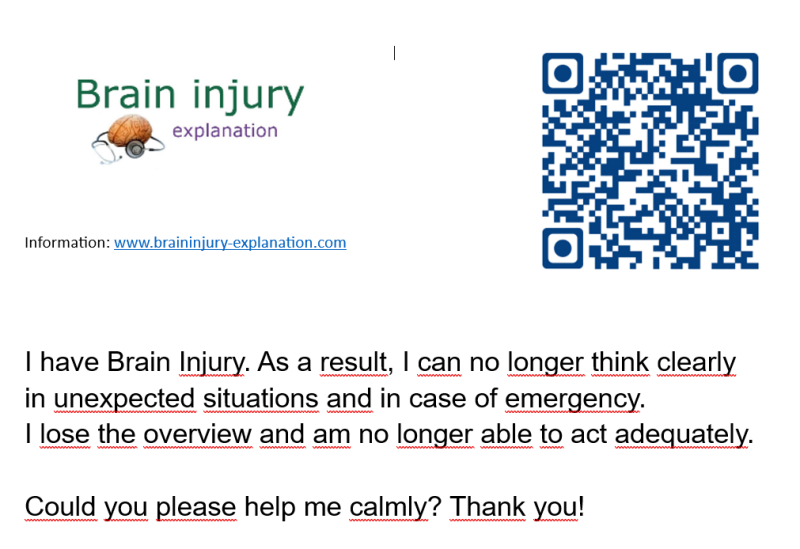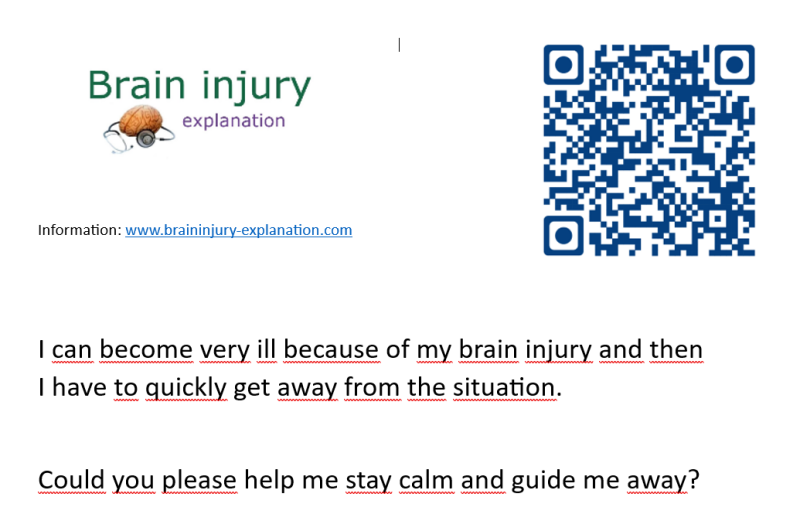Reduced stress resistence
Many people with brain damage have reduced stress resistance.
Apparent minor setbacks, but also emergencies, make thinking impossible.
In the event of adversity or panic, all brain structures are activated simultaneously to seek a 'helicopter view'. This is to prevent people from overlooking something.
Every thought process requires short electrical signals that are fired between brain cells. If all brain structures have to be switched on at the same time, this results in a "short circuit": acute overload in the brain circuit.
You can compare it to an electricity network where the fuses blow when all heavy power-consuming electrical appliances are switched on at the same time.
Glucose metabolism and neurochemical changes
Glucose is the main fuel source of the adult brain. After brain injury, a change/decrease is more often seen in the brain glucose metabolism of the cerebral cortex (cerebral glucose metabolism). Research is being conducted into the cause of this reduced uptake of glucose in the brain.
Neurochemical changes in signal transmission between brain cells is another explanation.
In addition, the stress hormone cortisol is secreted more quickly and the amygdala, which also has to process the stimuli, gives a stress alarm.
People with brain damage generally have more difficulty keeping an overview. The brain can no longer multitask.
Switching when there is change
It does not always have to be an emergency situation to cause someone with a brain injury to lose their ability to think.
It can happen if someone with whom this person had an appointment reschedules the appointment or shows up late. Packing a suitcase for a weekend away is another example of where the brain tries to make sure it doesn't forget anything.
Nervousness then sets in. Changes mean switching, which is literally 'switching' in the brain with all the neurochemical processes that entails. Not exactly something to be ashamed of if things don't go well.
Sense of time
It often appears that people with brain damage are less aware of how much time they have left before something starts or before they have to be ready or before they have to leave.
They are, so to speak, ready for the taxi an hour in advance, and cannot estimate what they could do in the meantime. They may even dare to do nothing anymore. The sense of time 'how long an hour or fifteen minutes lasts' has disappeared unnoticed.
Elapsed time or how much time you have left is abstract and can no longer be felt.
This can give you a restless, rushed feeling that you are always short of time. The partner or a bystander may indicate this as stress.
That does not always mean that there is stress.
It is often caused by the fact that a person with a brain injury is already thinking about something that he or she does not want to forget. All attention continues to focus on something, for example the taxi. Then there is no room in the head for any other activity.
Find a way through this together. Discuss it, make a plan for who will keep the time. Don't tell the person with a brain injury that he or she has fifteen minutes left. Because of the time perception disorder, that no longer means anything.
Time has become an abstract concept. You can clock different habits together. Visualize it.
Then you can safely say: "You have to be ready at a quarter past three. You have plenty of time if you go to the toilet at 'five minutes past three', and put on your jacket at 'ten minutes past three'.
Then you'll be ready in plenty of time to be ready at a quarter past three." That gives you peace of mind.
Tip: buy a Time Timer!
Basic conditions
Regularity, rest, structure and predictability are the basic conditions that someone with a brain injury thrives on and can make optimal use of his or her intellectual abilities. Anything that is unpredictable or disrupts the structure can be quite a stressor. Make sure you don't blame the person with brain injury for this. It's because of the injury.
From cold-blooded heart surgeon to 'stress chicken'
Meike was a heart surgeon before she suffered a brain injury. She was able to operate and save lives under the most stressful circumstances. She was often paged in the middle of the night in a life-threatening situation or to place a donor heart.
After her brain haemorrhage, she can still function intellectually, but those around her notice that she is easily stressed.
A leaking water pipe, a friend who arrives later than agreed causes so much stress that Meike can no longer think properly.
She has difficulty coming up with a solution for the leaking water pipe.
Those around her now call her 'stress chicken'. Meike experiences that as very derogatory. It does not match her self-image as a life-saving surgeon.
Below we show images of which, below them, you can download a PDF document to print yourself (six cards per A4 sheet).


Tips
-
Recognize the fact that you have become more sensitive to stress.
Have emergency plans ready. -
Provide emergency telephone numbers for people who are willing to think calmly in the event of an unexpected, serious or emergency situation.
-
Make sure you have telephone numbers ready for the GP post, police breakdown service for electricity, water supply, heating, internet, telephone a caretaker or landlord.
-
Tell your doctor. Not every GP knows about the invisible consequences of brain injury. This way, both the assistants and the doctor can think along with you better.
-
Download an emergency card that indicates that you can no longer think clearly in stressful situations. Laminate them and carry them with you.
-
Try to see if you can get outpatient guidance from an organization specialized in brain injuries. Such an organization often has an emergency number after office hours or a video call connection if you can no longer think.
-
After the stressful situation, explain that the brain cannot handle this 'overload' of having to use brain structures simultaneously after a brain injury. Hopefully those around you will be more understanding next time. Point them to this page.
-
Where possible, ask people to arrive on time as scheduled, or ask someone to call on time if it unexpectedly turns out to be later than planned.
-
Also realize that not everyone can understand this.
-
Unexpected visits and phone calls can make the brain go crazy. The braininjured person can no longer figure out how to deal with the new situation. This has to do with reduced flexibility (an executive function), but also with not being able to switch gears. The entire planning of consciously dealing with fatigue and resilience (rest schedule) can also become confused. That is not unwillingness, but powerlessness.